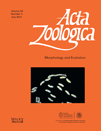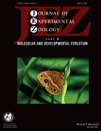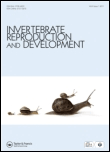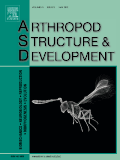
EVOLUTION & DEVELOPMENT
Scope & Guideline
Bridging Evolution and Development for a Deeper Understanding of Life.
Introduction
Aims and Scopes
- Evolutionary Developmental Biology (Evo-Devo):
A core area of focus is the study of how developmental processes influence evolutionary outcomes, including the evolution of morphological traits and body plans across various taxa. - Genetic and Epigenetic Mechanisms:
Research often explores the genetic basis of developmental processes, including the role of DNA methylation and gene expression in evolution, providing insights into how genetic changes drive phenotypic diversity. - Morphological Evolution and Ontogeny:
The journal emphasizes studies that investigate the relationship between ontogeny (development) and morphology, elucidating how developmental pathways contribute to evolutionary transitions. - Environmental Influences on Development:
Another prominent theme is the impact of environmental factors on developmental processes and how these interactions can lead to evolutionary adaptations. - Comparative Developmental Biology:
The journal promotes comparative studies across different species to understand the evolutionary significance of developmental variations and the conservation of developmental mechanisms.
Trending and Emerging
- Integration of Epigenetics in Evolution:
There is a growing focus on how epigenetic factors, such as DNA methylation and chromatin modifications, influence evolutionary processes, suggesting a trend towards understanding the role of non-genetic inheritance in evolution. - Developmental Plasticity and Evolutionary Responses:
Emerging research is increasingly examining how developmental plasticity—organisms' ability to alter their development in response to environmental changes—can facilitate evolutionary adaptation, showcasing the interplay between environment and evolution. - Complex Ontogeny and Life History Evolution:
Recent studies emphasize the complexities of ontogeny, including sexual dimorphism and life history strategies, reflecting an emerging interest in how these factors influence evolutionary trajectories. - Agency and Evolutionary Development:
A novel theme is the exploration of agency within biological systems, looking at how organisms actively shape their developmental and evolutionary paths, which may lead to new theoretical frameworks in the field. - Interdisciplinary Approaches:
There is a noticeable trend towards interdisciplinary research that combines insights from ecology, genetics, and developmental biology to address evolutionary questions, indicating a shift towards more holistic views of evolution and development.
Declining or Waning
- Traditional Morphometrics:
While still relevant, traditional morphometric studies are becoming less common, with a shift towards more integrative approaches that combine morphometric data with genetic and molecular analyses. - Purely Descriptive Studies:
There seems to be a decline in studies that focus solely on descriptive aspects of developmental biology without connecting them to evolutionary implications, as the journal increasingly favors research that integrates developmental insights with evolutionary theory. - Single-Taxon Studies:
Research centered on a single taxon without broader comparative context is declining, as the journal encourages studies that place findings within a wider evolutionary context across multiple taxa. - Focus on Fossil Evidence:
The emphasis on fossil evidence for understanding evolutionary development appears to be waning, possibly due to a growing preference for molecular and genetic approaches that offer more immediate insights into developmental processes.
Similar Journals

DEVELOPMENTAL DYNAMICS
Unraveling the Complexities of Life's DevelopmentDEVELOPMENTAL DYNAMICS is a prominent journal in the field of Developmental Biology, published by WILEY. This esteemed journal, identifiable by its ISSN 1058-8388 and E-ISSN 1097-0177, provides a critical platform for the dissemination of innovative research covering cellular and developmental processes across diverse biological systems. With a 2023 impact factor placing it in the Q2 category of Developmental Biology and an impressive Scopus rank of #39/82, the journal plays a vital role in advancing knowledge and fostering collaboration among researchers, professionals, and students. Although it is not an open-access publication, DEVELOPMENTAL DYNAMICS remains a cornerstone in the academic community, particularly for those dedicated to understanding the complexities of biological development. The journal's convergence from 1992 to 2024 reflects its longstanding commitment to high-impact research that influences both theoretical and practical applications in the field.

Genome Biology and Evolution
Fostering Collaboration in Evolutionary ScienceGenome Biology and Evolution, published by Oxford University Press, is a leading open-access journal that has been instrumental in advancing research in the fields of genetics and evolutionary biology since its inception in 2009. With an impressive Q1 ranking in both Ecology, Evolution, Behavior and Systematics and Genetics in 2023, the journal is recognized for its high-quality publications that contribute significantly to the understanding of genomic processes across diverse organisms. As part of its commitment to disseminating impactful research, it is dedicated to fostering interdisciplinary collaboration among scientists and providing a platform for innovative findings. Researchers, professionals, and students alike are encouraged to explore the wealth of knowledge within its pages, contributing to ongoing discussions that shape our understanding of evolutionary mechanisms and genomic data interpretation. With its robust access options and a strong commitment to wide dissemination of research, Genome Biology and Evolution remains an essential resource for anyone engaged in the life sciences.

MOLECULAR REPRODUCTION AND DEVELOPMENT
Connecting researchers to advance the science of reproduction.MOLECULAR REPRODUCTION AND DEVELOPMENT is a prestigious peer-reviewed journal published by WILEY, specializing in the intricate domains of Cell Biology, Developmental Biology, and Genetics. Since its inception in 1988, this journal has been a vital platform for disseminating pioneering research and innovative methodologies that advance our understanding of molecular mechanisms driving reproduction and development. With a current impact factor reflective of its significance in the field, MOLECULAR REPRODUCTION AND DEVELOPMENT is ranked Q3 in both Cell Biology and Developmental Biology, and Q2 in Genetics, underscoring its relevance and scholarly contribution. Catering to a diverse audience of researchers, professionals, and students, this journal not only showcases cutting-edge findings but also aims to foster interdisciplinary exchanges that enhance scientific collaboration. By exploring critical biological processes, it ultimately contributes to the broader understanding of health and disease in various organisms, making it an essential resource for anyone dedicated to the life sciences.

ACTA ZOOLOGICA
Contributing to the Future of Zoological ResearchACTA ZOOLOGICA, published by WILEY, is a distinguished journal that serves as an essential resource for researchers and professionals in the fields of Animal Science, Zoology, Cell Biology, and Ecology. With its ISSN 0001-7272 and E-ISSN 1463-6395, this journal has been contributing to the scientific community since 1920 and continues to explore new dimensions in zoological research. As of 2023, it holds an impactful position with a Q3 ranking in Animal Science and Zoology as well as Ecology, Evolution, Behavior and Systematics, signifying its relevance and emerging influence in these domains. Although it is not an Open Access journal, ACTA ZOOLOGICA remains committed to disseminating high-quality research and facilitating scholarly discussions among its audience. The journal aims to publish original articles, reviews, and critical findings that enhance understanding of animal biology and conservation, addressing global ecological challenges. Its rankings in Scopus further underscore its scholarly reputation, making it a valuable addition to the libraries of institutions and individuals alike.

JOURNAL OF EXPERIMENTAL ZOOLOGY PART B-MOLECULAR AND DEVELOPMENTAL EVOLUTION
Transforming understanding in molecular and developmental sciences.JOURNAL OF EXPERIMENTAL ZOOLOGY PART B-MOLECULAR AND DEVELOPMENTAL EVOLUTION, published by Wiley, is at the forefront of research in the fields of molecular biology, developmental biology, and evolutionary science. With an impressive impact factor reflective of its significance, this journal maintains a prominent position in the academic landscape, evidenced by its Q1 ranking in Animal Science and Zoology, as well as Ecology, Evolution, Behavior and Systematics for 2023. It rigorously publishes innovative research spanning a wide array of topics pertinent to molecular and developmental evolution, making it an invaluable resource for researchers, professionals, and students alike. This journal not only offers Open Access options, enhancing the visibility of groundbreaking findings, but also supports interdisciplinary collaboration by integrating insights from genetics and molecular medicine. With a commitment to advancing knowledge, the journal is poised to contribute significantly to our understanding of biological processes and evolutionary dynamics through its convergence of research from 2003 to 2024.

INVERTEBRATE REPRODUCTION & DEVELOPMENT
Unraveling the Mysteries of Invertebrate Biology.INVERTEBRATE REPRODUCTION & DEVELOPMENT, published by Taylor & Francis Ltd, is a pivotal journal in the fields of Animal Science and Zoology, with a significant focus on the reproductive and developmental processes of invertebrates. Established in 1989 and running through 2024, this journal has become an essential resource for researchers, professionals, and students interested in the intricacies of invertebrate biology. With an impressive Q2 ranking in Animal Science and Zoology and a dedicated readership, the journal explores a variety of topics including reproductive mechanisms, developmental stages, and phylogenetic aspects of invertebrates. While currently not open access, the journal provides robust scholarly content that contributes to advancing knowledge in both basic and applied biological sciences. The Scopus rankings further underscore its relevance, particularly in the domains of developmental biology and genetics, making it a noteworthy publication for those engaged in this dynamic field of research.

Open Biology
Pioneering interdisciplinary research for a better tomorrow.Open Biology is a prestigious, interdisciplinary journal published by the Royal Society that has been paving the way in the fields of Biochemistry, Genetics and Molecular Biology, Immunology, and Neuroscience since its inception in 2011. Catering to a global audience of researchers, professionals, and students, Open Biology operates under an open access model, facilitating the unrestricted dissemination of high-quality research findings. With a current impact factor that positions its categories in the top quartile (Q1) and impressive Scopus rankings—evidencing its influence and reach—this journal serves as a vital platform for innovators and scientific inquiries aimed at advancing our understanding of life sciences. The journal's commitment to publishing cutting-edge research makes it an essential resource for those at the forefront of scientific exploration.

Evolutionary Bioinformatics
Unlocking the secrets of evolution through bioinformatics.Evolutionary Bioinformatics, published by SAGE Publications Ltd, is a pioneering open-access journal established in 2005, dedicated to advancing the field of evolutionary biology through innovative computational techniques and bioinformatics. With an ISSN of 1176-9343, it serves as a critical platform for researchers, professionals, and students to disseminate impactful findings and foster collaboration across disciplines. The journal spans a broad scope, contributing significantly to the areas of Ecology, Evolution, Behavior and Systematics, and Genetics, as evidenced by its respectable Scopus rankings and quartile placements in 2023. With a commitment to providing comprehensive, peer-reviewed research articles and tools for sharing knowledge, Evolutionary Bioinformatics plays an essential role in shaping the future of evolutionary studies and bioinformatics. Readers and contributors alike are encouraged to engage with cutting-edge research that pushes the boundaries of understanding in this dynamic field.

PLoS Genetics
Driving discoveries in genetics for a healthier tomorrow.PLoS Genetics, published by the PUBLIC LIBRARY SCIENCE, is a leading open-access journal dedicated to advancing the field of genetics, molecular biology, and related disciplines. With its ISSN of 1553-7404, this esteemed journal has been offering unrestricted access to its content since 2005, fostering a global community of researchers, professionals, and students. Situated in the United States, its contributions can be found at 1160 Battery Street, Ste 100, San Francisco, CA 94111. As of 2023, PLoS Genetics proudly holds a Q1 ranking in multiple categories including Cancer Research, Ecology, Evolution, Behavior and Systematics, Genetics, and Molecular Biology, underscoring its impact in these vital scientific areas. The journal's commitment to disseminating high-quality research is reflected in its impressive Scopus rankings, with notable positions in various fields of study, ensuring that it remains a crucial resource for cutting-edge research and innovation. By providing an open-access platform, PLoS Genetics not only enhances the visibility of genetic research but also encourages collaborations and the sharing of knowledge that can lead to significant breakthroughs in science.

ARTHROPOD STRUCTURE & DEVELOPMENT
Exploring the Intricacies of Arthropod DevelopmentARTHROPOD STRUCTURE & DEVELOPMENT, published by Elsevier Science Ltd, is a leading journal dedicated to the intricate study of arthropod morphology, physiology, and developmental biology. With an ISSN of 1467-8039 and an E-ISSN of 1873-5495, this journal plays a critical role in advancing our understanding of insect science as demonstrated by its impressive Q1 ranking in this category. It occupies a respected position within the academic landscape, being ranked Q3 in Developmental Biology and Q2 in both Ecology, Evolution, Behavior and Systematics, and Medicine (miscellaneous), illustrating its interdisciplinary appeal. Covering research from 2000 to 2024, ARTHROPOD STRUCTURE & DEVELOPMENT offers a robust platform for researchers who are keen to unlock the complexities of arthropod life, contributing significantly to the fields of entomology and ecological research. Open access options ensure that groundbreaking discoveries are readily available to a global audience, fostering collaboration and innovation. As a vital resource for students, professionals, and academics, this journal is indispensable for those dedicated to exploring the fascinating world of arthropods.